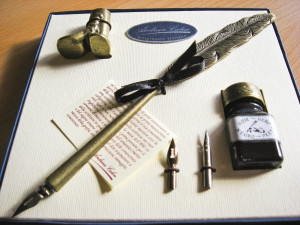Ask the Agent: Piracy, Careers, and Marketing
A bunch of interesting questions have come in, so let’s get to them…
“Every couple months I find one of my novels online illegally as a free download. I complain, they usually take it down, and then someone puts it back up soon after. My publisher says they’re sorry, but it’s part of the biz. (I assume that’s true because they’re losing money too.) Are there any tech innovations that might prevent this?”
There are tech innovations that will locate a pirated manuscript, but I don’t know of any that will prevent it. And yes, this is a growing and annoying (and potentially expensive) problem in the industry. Pirated tracks helped kill the music business, and publishers tend to come down hard by threatening legal action against those who violate copyright. Publishers tried to protect themselves by using DRM with ebooks, but that has proven to be ineffective to stopping piracy. My guess is that the government will continue to seek out methods for strengthening copyright, just as pirates will continue to look for ways to cheat authors out of their rightful income. (I’m one of those who has no patience with people who want to illegally give away the artistic creations of others.)
“At the age of fifty I began writing professionally. I’m now past sixty, and over the last decade I have typically been able to bring in between $1500 and $12,000 a year via my writing, mostly through articles. I enjoy my full time job, and it fits well with my writing, so I do not foresee ever having a writing career or a platform sufficient to make an agent beg. Do I have a shot at getting an agent? If so, what can I do to improve the odds?”
If you are mainly writing articles, you don’t stand a great chance of landing an agent in today’s publishing world. But I know from your note to me that you’ve got a couple completed nonfiction books you are pitching, and for those I would say, “Of course you stand a chance of landing an agent.” Most agents are looking for writers who work hard, sell books, and have a track record. Your article writing has proven that. So I think you can significantly improve your odds if you were to craft a well-written book that offers insightful answers to a perceived need, demonstrate to the agent that you are the right person to be writing on the topic, and (most importantly) be able to show that you have a significant enough platform to reach the readers of that book. In my view, if you focus on those three things, you stand a very good chance to landing an agent.
“Do you think a Facebook tour can be useful for marketing your novel? I had a friend offer to post things on FB, because she doesn’t have a blog, and I wondered if it might be helpful.”
I’ve seen a bunch of novelists market their book on Facebook, and it’s certainly one part of an overall strategy. You can use it to announce the book, to solicit participation, to get the team excited. So it can be effective, but there are limitations… It tends to only reach your friends. It can be annoying if it comes across as pushing too hard to sell a product. It’s usually not the type of thing that will be shared. But when taken as a part of the overall marketing plan, it can certainly useful.
“I recently left my full-time job to follow my dream of becoming a freelance writer and author. The transition has been both thrilling and overwhelming. I’m working on a non-fiction, self-help book. So much of the information I read on publishing is for fiction. Where does a non-fiction author begin to network and find the right fit for representation?”
There are a number of ways a nonfiction writer can network with other writers. First, you can hook up with a local writing group, which you may be able to find through friends or your local bookstore. Or you could see if there is a local writing class at a community college or a nearby university – such classes often see a lot of local writers participate. You can also check into national writing organizations, such as the American Society of Journalists and Authors or American Business Media (check out the list of national writing organizations at Writers Write). There are also many online writing groups for nonfiction writers, including The Writers Café, Absolute Write, The Write Idea, The Writers Beat, and a host of others. Just a bit of searching online will reveal more than a dozen. Another great way to hook up with other writers is via writing conferences, which you can easily find online. Some conferences focus on one type of writing or genre, but many are great for making connections with other nonfiction writers. As for finding representation, the process for a nonfiction writer isn’t much different from that of a novelist – you built your platform, create a great proposal, and seek out an agent either at a conference or by doing some research to see who represents works in your field. Again, with a nonfiction manuscript, the first two questions an editor is going to ask an agent are, “What’s the author’s platform?” and “What are the author’s qualifications for writing on this topic?”, so make sure you can answer those adequately before going to talk with an agent.
And a favorite question of mine: “What 10 editorial mistakes do most novice authors make?”
I suppose if you asked this of ten agents, you’d probably get a hundred total answers, but here are my pet peeves with newbie authors:
- Too many exclamation points!!!
- A proposal that has not been proof-red
- Overpromising, as in “This proposal will sell a billion copies!”
- FEELING A NEED TO PUT LOTS OF WORDS IN ALL CAPS.

- Random numbering in an outline.
- I did this, I did that, I did this other thing, I, I, I.
- Random commas, that make no, sense.
- A failure to understand how to properly use “quotation” marks. (Also parentheses. And their attached punctuation).
- Failing to understand the difference between its and it’s (or there and their and they’re).
- The manuscript is passive due to the author.
Hint for the humor impaired: There are intentional errors in that list. If you see one, don’t send me a scolding note or you’ll be banned from the blog. It’s a joke. I know you don’t get it. Just trust me – others find it funny.


10 Comments
I suspect the overuse of the “Shatner comma” can be blamed on all those schoolteachers who said (incorrectly) you put a comma where you would pause for breath while reading out loud. Therefore authors who want their writing to come across as literary and dramatic feel the need to add a lot of, dramatic, pauses, signalled, by commas.
Or by periods: … the need to add a lot of dramatic. pauses. signaled. by. periods. My question is where did this come from?
Single words separated by periods are a pet peeve of mine, too. Instead of dramatic tension, to me, they come across as robotic. (Though I confess to using too many ellipses to indicate a pause . . . but only in my initial draft.)
You know, Iola, you’re right, because all of us, all the fans of Shatner, appreciate him, his wisdom, his great, acting, and his, rediscovery, of the pause, fraught with portent.
Exactly.
I’m a big Shatner fan, but yeah. The commas.
I got it–how about that!!!!!!!
Chip, You’re “list” is very FUNNY, and, so very, troo. Thanks (for share-ing).
Your to funny. :o)
Laughter was induced in the reader due to the jokes made by the agent.
The reader was thanked by the agent for her good judgment. (And your great blog last Friday, Robin!)